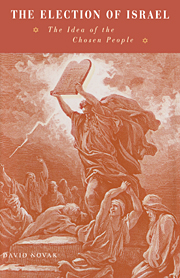Book contents
- Frontmatter
- Contents
- Preface
- List of abbreviations
- General note
- Introduction
- 1 Spinoza and his challenge
- 2 Hermann Cohen's concept of election
- 3 Franz Rosenzweig's return to the doctrine
- 4 The retrieval of the biblical doctrine
- 5 The rabbinic development of the doctrine
- 6 Two medieval views of election
- Conclusion
- Appendix 1 Some major Jewish thinkers cited
- Appendix 2
- Appendix 3
- Appendix 4
- Bibliography
- Index
5 - The rabbinic development of the doctrine
Published online by Cambridge University Press: 18 December 2009
- Frontmatter
- Contents
- Preface
- List of abbreviations
- General note
- Introduction
- 1 Spinoza and his challenge
- 2 Hermann Cohen's concept of election
- 3 Franz Rosenzweig's return to the doctrine
- 4 The retrieval of the biblical doctrine
- 5 The rabbinic development of the doctrine
- 6 Two medieval views of election
- Conclusion
- Appendix 1 Some major Jewish thinkers cited
- Appendix 2
- Appendix 3
- Appendix 4
- Bibliography
- Index
Summary
WHO CHOSE WHOM?
In the biblical presentation of the doctrine of the election of Israel, the roles of God as the elector and of Israel as the elected are evident and consistent. It is God who initiates the relationship with Israel, and it is Israel who is to respond to that initiation. Even when Israel does not respond to God's election of her, when she turns away from the God who chose her, the election is not thereby annulled. It is simply reiterated by whatever means God so chooses at the time. Any attempt to see this relationship as some sort of contract, some sort of bilateral pact between two autonomous parties, is clearly at odds with biblical teaching. In the Bible, God alone is autonomous, and God alone can make initiatory choices with impunity. Israel's only choice seems to be to confirm what God has already done to her and for her. To choose to reject what God has done to her and for her is an unacceptable choice that cannot be allowed to persist. For Israel, there are no multiple options, as we understand that term today.
Nevertheless, as we have already seen in some of the rabbinic teachings brought in to explain Scriptural texts in the previous chapter, the relationship of God and Israel is more than one from God to Israel, one where God is the active initiator and Israel the passive recipient. If that were all there is to the relationship, it would be much less rich than the actual covenant (berit) that exists in which both God and Israel are joined.
- Type
- Chapter
- Information
- The Election of IsraelThe Idea of the Chosen People, pp. 163 - 199Publisher: Cambridge University PressPrint publication year: 1995



